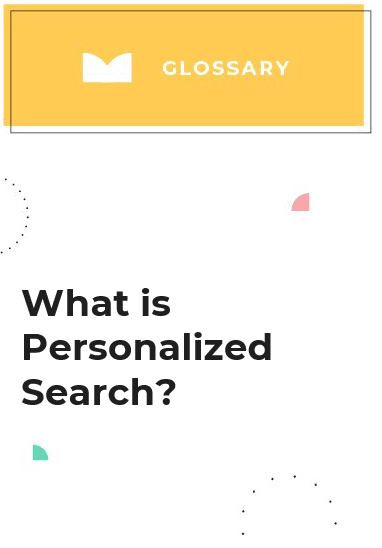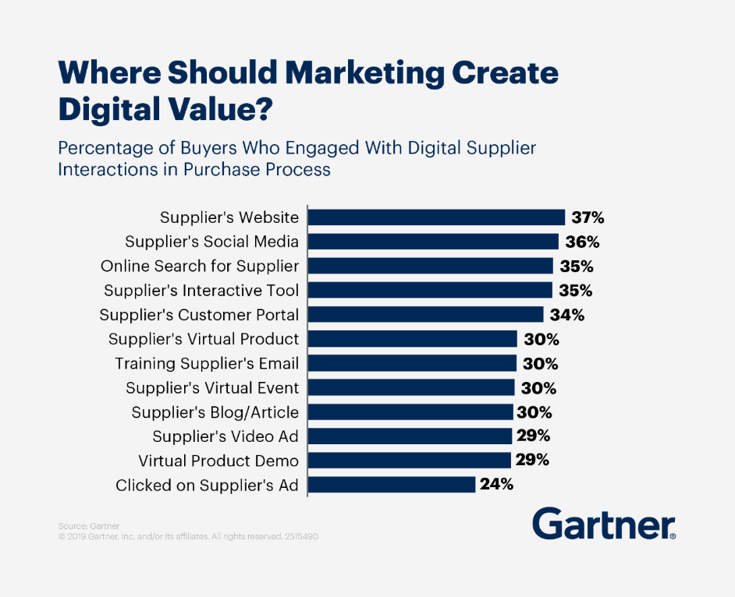
What is Personalized Search?
Personalized search combines two key ingredients critical to creating good digital experiences – data and artificial intelligence. It uses data and machine learning algorithms to produce uniquely personalized results when a user enters a search query into a search tool.
Natural language processing (NLP), a subset of AI, enables personalized search tools to understand the intent and meaning behind a user query. This is what we mean by “intelligent” search – by understanding search intent, the search engine can retrieve more relevant results.
The goal of personalized search is to provide users with more relevant and useful search results than they would otherwise receive without the behind-the-scenes AI technology working to analyze user data, identify patterns, and produce relevant results.
In the following post, we’ll delve into how personalized search works, provide some tangible examples of Monetate customers that are using it effectively, and wax poetic about its benefits (while touching on some of its inherent challenges).
How Does Personalized Search Work?
Personalized search engines work largely because of AI technology, data, and a bit of human fine tuning. A personalized search tool considers the context of an individual’s search, historical purchase behavior (if they’re logged in) and current browsing behavior.
In an ecommerce setting, this equates to helping shoppers find what they need, discover products they like, and get relevant results on both mobile and desktop devices.
Personalized search engines get better over time. They “learn” by deploying machine learning and AI to continually optimize search performance based on shopper behavior. They are able to produce different results for each user based on this information. AI also makes it possible for searchers to be imprecise – a user’s query doesn’t need to be spelled correctly or phrased exactly as it appears in your content to produce relevant results because:
- The system automatically adds synonyms, adjusts for plurality, and normalizes things like colors measurement (this is called “semantic enrichment”).
- Makes use of “facet filtering” which lets shoppers fine tune their results.
- Has out-of-the-box support for many languages.
- Ecommerce-focused personalized search systems like Monetate support merchandising via a white labeled UI.
Personalized Search Examples
To illustrate how all of this works in the real world, here are three examples of common ecommerce use cases for personalized search:
- Product Discovery: A customer is on the hunt for a new black dress. They begin typing “black party dress” into the search bar and personalized search kicks in. The system displays images of your top selling black dresses combined with styles similar to dresses the customer has purchased in the past (e.g., maxi dresses, high neckline, etc.) There’s no need for the customer to finish typing or sift through pages of results – they’re presented with a few compelling options instantly.
- Advanced Search Tuning: You can tweak personalized search results to showcase products based on current campaigns, inventory, or trends – whatever matches your business objectives. When a customer searches for something on your website, the search algorithm puts the products you want to highlight front and center in the results, and may put other items lower in the results (a process known as “searchandising”). It’s a win-win – the customer finds what they need quickly while you showcase the items or content you want to highlight the most.
- Mobile-Ready Search: With more and more people shopping on their phones, personalized search is critical for mobile usability. Things like auto-complete suggestions, visual results, and easy-to-tap buttons are designed to help shoppers find content fast – while minimizing frustration – even on a small screen.
Personalized search shouldn’t be considered optional. It offers some clear benefits to all businesses, particularly in the retail sector. Next, we unpack why this feature is so important to businesses and consumers.
Why is Personalized Search Important?
Personalized search is a ubiquitous part of our online lives. From Google to Netflix to Amazon, AI systems use vast amounts of consumer data to provide curated content recommendations like movie recommendations, products we might like, and customized search results.
When someone lands on your site, they’ll likely expect this same level of tailored attention. If your search results are generic and one-size-fits-all, there’s a good chance your website visitors will get frustrated. They may even abandon your site for more personalized pastures.
That’s because personalized search makes online shopping a whole lot easier and more enjoyable. When a shopper searches for a product, they want to find what they’re looking for fast, but they also want to learn about similar products they might like (personalized product suggestions) and what other people might be buying (social proof). This is the kind of tailored search experience that has made Amazon so successful. It’s customer-centric, data-driven, and meaningful to the searcher.
But personalized search is also incredibly beneficial for businesses. It allows you to curate products and content by showcasing them in the search results. This means you can move inventory based on what’s in stock, help customers discover new items, and bury items based on parameters you set. This is true for both B2C and B2B shoppers. The B2B space, in particular, is increasingly turning to digital channels to complete the lion’s share of the buying journey.
How is Personalized Search Used in B2B Commerce?
B2B organizations have found 1-to-1 personalization to be a tougher nut to crack compared to their B2C counterparts. Obstacles include a historical reliance on face-to-face sales meetings and a lack of robust data about buyers and buying groups.
As the B2B buying journey increasingly mirrors B2C shopping experiences – with more interactions and transactions happening online – personalized search is gaining traction among sellers. It’s a powerful frontline tool that can guide B2B buyers to important content, products, and information with minimal (or no) interaction with live sales reps.
That last point is important because three-quarters of B2B buyers prefer a “rep-free” sales experience. The top channel used buy B2B buyers is the supplier’s website, but multiple digital channels come into play across the very complex B2B buying journey including social media, search, and customer portals. Chart Source Below: Gartner
Across all the many apps, touchpoints, and channels inherent in the B2B buying journey, personalized search is uniquely positioned to enhance this self-serve buying experience because:
- It uses relevant data about the buyer’s industry, company size, purchase history, and other attributes to produce relevant products, content, and information.
- It employs visual search and product finders to help buyers identify products based on specific criteria such as dimensions, materials, and technical specs.
- It’s an effective cross-selling and upselling tool. As with B2B ecommerce, B2B sellers can optimize search results to showcase top-performing B2B products, high-margin items, or products connected to the buyer’s industry.
- It delivers better search experiences on mobile devices, making it easier and more convenient for B2B buyers who are often on the go or working remotely.
- It scales, allowing B2B businesses to incorporate appropriate new content and products into search results even as catalogs and buyer bases grow.
Next we’ll address some specific benefits and challenges of implementing personalized search.
Pros and Cons of Personalized Search
To be clear – we know from firsthand experience how important personalized search results are for bottom-line metrics like conversion rate (CVR), revenue per session (RPS) and return on investment (ROI). That said, here’s a rundown of some pros and cons.
The Good:
- Personalized search makes your data actionable. That is, it leverages all the user and behavior data you’re constantly accruing to create a better ecommerce experience. Combined with smart AI algorithms and manual fine-tuning, personalization platforms like Monetate can deliver spot-on, tailored results.
- Personalized search results have also significantly improved our clients’ conversions, sales, and other KPIs. That’s because it reduces friction (and frustration) by connecting the searcher to specific content in a way that motivates them to buy that shirt or download that whitepaper.
- Personalized search results also keep you competitive, particularly when you consider the high expectations of B2B buyers who are now driving an increasingly self-serve buying journey.
- Personalized search saves both B2B and B2C buyers time by reducing irrelevant results and personalizing the overarching digital experience. It provides context. It helps people feel known by recognizing their needs in the context of their past behavior and what they want from a given search at a given point in time.
At Monetate, we’re big advocates of personalized search, but we know it’s not without its challenges. There are things you should consider so you can set your expectations appropriately and have the right resources in place.
The Challenges:
- Most people worry about privacy and data usage, so it’s critical to have a comprehensive data governance policy in place. You should be fully transparent about how you use customer data and allow people an easy way to opt out if they choose.
- The good news is that consumers remain willing to share their data in exchange for more relevant online experiences, particularly when it comes to shopping. In a 2023 Statista survey of 11,000 consumers and 3,300 business buyers, 73% said they expect better personalization when they give companies more data.
- Another thing to consider – personalized search needs the right infrastructure and oversight to work well. Poorly designed or maintained algorithms could potentially reinforce biases or filter out important information.
- Implementing personalized search effectively requires significant technical expertise and resources. It also needs high-quality, robust data to power the search results and the right expertise to manage the data-heavy technologies that power personalization and AI.

How can Personalized Search Technology Enhance Your Business?
Personalized search technology like Monetate’s can provide significant benefits for your business. By understanding the intent behind each shopper’s search and leveraging behavioral data, it produces relevant search results at the individual user level. It makes product discovery easier. It also learns from past behaviors and interactions, so that it gets continuously better at producing relevant results.
Monetate’s personalized search feature offers key capabilities including natural language processing, machine learning optimization, semantic enrichment, and a flexible UI. It fits neatly into our other personalization offerings which means that you can deliver seamless end-to-end digital experiences.
The digital landscape promises to get more competitive as hybrid and remote shopping expands and shifts. Investing in personalized search positions you to exceed customer expectations, build loyalty, and grow your business.
To see how Monetate can help you curate more powerful, intuitive search experiences, schedule a demo today. Our experts will work with you to understand your unique needs and craft a solution that works for you and your customers.
